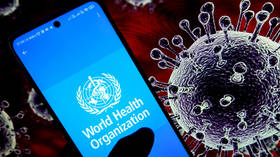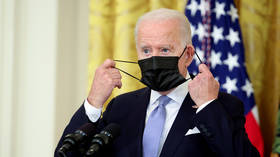New Covid wave sweeping world – WHO

More than 1.4 million new cases of Covid-19 and over 1,800 deaths attributed to the disease were registered around the world from July 31 to August 27, the World Health Organization said on Friday.
The figures represent a 38% increase in the number of cases and a 50% decrease in the number of deaths from the previous 28-day period, the WHO said in its weekly bulletin.
South Korea had the highest number of both new cases (1,296,710) and deaths (596), the WHO said. Italy had almost 27,000 new cases, followed by the UK with 26,000.
The largest increase in new cases was in the Eastern Mediterranean (+113%), Western Pacific (+52%) and the European Region (+39%), while Africa (-76%) and South-East Asia (-48%) saw a decline.
The WHO is attributing the increase in cases to the ‘Eris’ variant of the novel coronavirus, which is now the most widespread, having been found in 26% of sequences during the second week of August. The ‘Arturo’ variant was found in 22.7% of sequences in 109 countries, while ‘Kraken’ was reported by 124 countries but seems to be receding.
According to the WHO, there have been more than 770 million cases of Covid-19 and over 6.9 million deaths from the virus since the beginning of the pandemic.
Though the WHO declared an end to the “global health emergency” in May, the organization has reminded member states to “maintain, and not dismantle, their anti-Covid-19 infrastructures,” urging them to keep in effect the systems of “early warning, surveillance and reporting, variant tracking, early clinical assistance [and] vaccination boosters for high-risk groups.”
Friday’s bulletin was the last-ever weekly update by the WHO, which intends to transition from emergency response to long-term “prevention, control and management“ of Covid-19. The updates will be monthly from now on, with the next one due at the end of September.
The novel coronavirus, later dubbed SARS-CoV-2, was first detected in Wuhan, China in late 2019. Its exact origin and how it came to affect humans remain unknown. The WHO dubbed the disease caused by the virus Covid-19 and declared it a pandemic in March 2020. Many countries attempted to deal with the virus by ‘locking down’ their populations and mandating face masks and vaccines, while cracking down on anyone who criticized the effectiveness of these measures.













